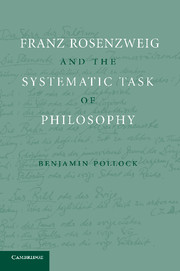Book contents
- Frontmatter
- Contents
- Acknowledgments
- Introduction: The Star of Redemption as “System of Philosophy”
- 1 System as Task of Philosophy: “The Oldest System-Program of German Idealism”
- 2 “A Twofold Relation to the Absolute”: The Genesis of Rosenzweig's Concept of System
- 3 Alls or Nothings: The Starting-Point of Rosenzweig's System
- 4 “The Genuine Notion of Revelation”: Relations, Reversals, and the Human Being in the Middle of the System
- 5 Seeing Stars: The Vision of the All and the Completion of the System
- Conclusion: The All and the Everyday
- Bibliography
- Index
Introduction: The Star of Redemption as “System of Philosophy”
Published online by Cambridge University Press: 28 July 2009
- Frontmatter
- Contents
- Acknowledgments
- Introduction: The Star of Redemption as “System of Philosophy”
- 1 System as Task of Philosophy: “The Oldest System-Program of German Idealism”
- 2 “A Twofold Relation to the Absolute”: The Genesis of Rosenzweig's Concept of System
- 3 Alls or Nothings: The Starting-Point of Rosenzweig's System
- 4 “The Genuine Notion of Revelation”: Relations, Reversals, and the Human Being in the Middle of the System
- 5 Seeing Stars: The Vision of the All and the Completion of the System
- Conclusion: The All and the Everyday
- Bibliography
- Index
Summary
This book argues that franz rosenzweig's the star ofRedemption is devoted to a singularly ambitious philosophical task: grasping “the All” – the whole of what is – in the form of a system. Since Rosenzweig himself insisted his book be understood solely as a “system of philosophy,” such a claim would certainly appear straightforward were it not for the curious fact that so many of Rosenzweig's readers, from his time down to ours, have sought to locate the significance of the Star anywhere but in the book's systematic character. Indeed, the Star's importance is often claimed to lie precisely in the way it opposes philosophy's traditional drive for systematic knowledge and upholds instead a “new thinking” attentive to the existential concerns, the alterity, and even the revelatory dimension of concrete human life. In what follows, I will show that these very innovations in Rosenzweig's thought are in fact to be understood as part and parcel of the Star's systematic program. But this is only the case, we shall find, because Rosenzweig approaches philosophy's traditional task of system in a radically original manner. For the Star not only seeks to guide its readers on the path toward knowing “the All” of which each being is a part; it at once directs them toward realizing the redemptive unity of that very “All” through the actions, decisions, and relations of concrete human life.
- Type
- Chapter
- Information
- Publisher: Cambridge University PressPrint publication year: 2009

